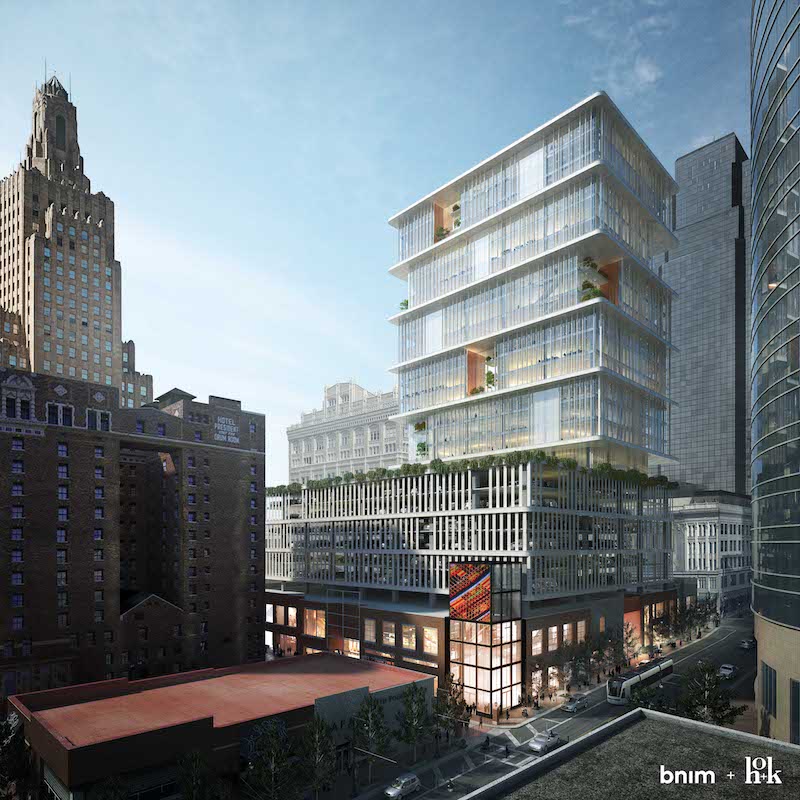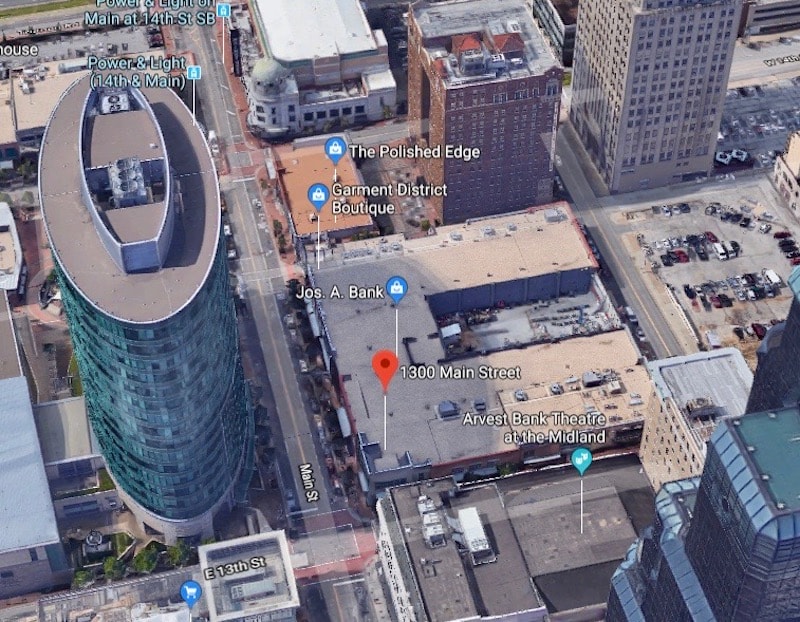Divided City Council Delays Vote on $133M Strata Office Plan

Published September 19th, 2019 at 12:15 PM
By Kevin Collison
Updated Sept. 19: The City Council voted 6-5 Thursday to give the developers of the proposed 25-story Strata office tower another week to return with a plan that substantially reduces or eliminates the city’s credit risk.
While several Council members, including Mayor Quinton Lucas and Councilwoman Kathryn Shields, wanted to kill the $133 million redevelopment plan outright, there was enough support to give the developers more time.
The sticking point appeared to be the developer’s request for the city to back private loans totaling $63 million that would go towards building the garage and the tower.
Councilman Lee Barnes made the motion for a one-week delay.
“I think we need Class A office space,” he said, “but the city is putting its credit behind this project.
“We’re at the point where there’s only so much we can do…if we can get a deal where the city’s not backing the deal, I’m willing to support it.”
Barnes urged the developer to find an ‘equity” partner that would take the city’s place guaranteeing the loans.
Both Shields and Lucas opposed the delay, saying one week would not make a difference in making the financing plan more acceptable.
“This has been a complicated process,” Shields said. “Nothing will change in a week. There no magical entity that will drop from the sky and say ‘city, you won’t have to back $63 million.'”
Council members Barnes, Kevin O’Neill, Dan Fowler, Eric Bunch, Ryana Parks-Shaw and Kevin McManus voted for the delay. It was opposed by Lucas, Shields, Teresa Loar, Brandon Ellington and Melissa Robinson
Councilwoman Andea Bough abstained. Councilwoman Heather Hall, who had expressed qualified support for the project at the Council Finance Committee, was absent.
Developer Jon Copaken said his team has its work cut out for them trying to answer the Council’s concerns.
“We have a lot of work to do,” he said.
“At the moment, we don’t seem to have support for the project. I’m not sure what Lee has in mind. I think the project stands on its own and minimizes the risk to the city.”
The following was reported from the Council Finance Committee Wednesday:
Backers of the 25-story Strata office tower proposed for the Power & Light District finally will have their redevelopment plan considered by the full City Council following a tepid reception from a Council committee Wednesday.
Members of the Council Finance Committee voted unanimously to send the $133 million Strata development plan to the full Council without recommendation after a two-plus hour hearing.
The Strata deal is scheduled to be considered by the Council today (see update above in italics), but there is a significant chance a vote will be delayed as newly-elected members and Mayor Quinton Lucas take the measure of their first big private project seeking public financial assistance.
“We’re optimistic we have the support at the Council level to get the project approved,” said Jon Copaken, a principal at Copaken Brooks, a co-developer in the project.
The Strata plan calls for a 250,000 square-foot office tower and 780-space garage to be built above an existing retail building in the Power & Light District at the southwest corner of 13th and Main.
It’s being pursued by Power Tower, a development entity that includes Copaken Brooks, Jury & Associates and H&R Block.
The general outline of the Strata redevelopment plan was approved by the previous Council in January.
A Finance Committee that included outgoing Council members endorsed the financing plan in June, but final consideration before the full Council was put on hold until after the new Council was seated.
To sweeten its appeal to the Council, an earlier financing proposal that called for the city to directly invest $27 million in cash in the project in return for a share of its potential profits has been changed.
The city will instead allow its credit to back $27 million borrowed by the developers. That means it would cover any shortfalls should revenues fall below projection.
“It’s no longer a straight city deal,” City Manager Troy Schulte told the Finance Committee. “We tried to put in enough protections to make sure the project proceeds privately with the city as a backstop.”
Strata would be built on a speculative basis, that is, without tenants committed beforehand.

The Strata project is planned for the block between Main and Baltimore, from 13th to 14th streets immediately west of the H&R Blocks headquarters. (Image from Google Maps)
Economic development officials say it’s needed because downtown has not had a major office building completed since 1991, and companies have bypassed it because there is not enough premium space readily available.
“Our downtown market is stagnant,” said Greg Flisram, acting director of the KC Economic Development Corp. “We’re missing out on ‘looks’ as well as projects, and falling behind our peer metros.”
Another key factor influencing the Strata plan is a commitment made to H&R Block when the Power & Light District redevelopment agreement was made in 2004 between the city and the Cordish Co.
The agreement gave H&R Block the right to build a second tower at the site proposed for Strata. It also called for the city to provide parking for the project.
If Block fails to develop the site by 2027, then Cordish will have the development rights. Schulte said Cordish would like to build another residential tower, and the city would be obligated under the agreement to provide parking for it.
Cordish officials have complained to the city that Block’s participation in the Power Tower partnership does not fulfill the terms of the 2004 agreement, observing the company does not plan to be a tenant in the proposed building.
Brian Bock, manager of acquisitions and development at H&R Block, said his firm believes its participation follows the agreement.
“We feel this is a continuation of the original development and we’re confident we have the development rights,” he said.
The Strata development is broken down into two components, a $36 million garage and a $97 million office building.
The financing plan calls for the seven-level garage to be financed using revenues generated from parking revenues and a state program called the Advanced Industrial Manufacturing (AIM) Zone.
Port KC would be the administrator for the AIM program funding and would own the garage making it tax exempt. AIM allows half of the state employee withholding taxes generated by employees in the new project to help finance its cost.
The office building could accommodate up to 1,100 employees.
The city would use the parking revenues generated by the garage to pay for its share of the cost and would be guaranteed the first $75 for each space per month.
The city also is being asked to back the $36 million garage bond.
The garage deal is far less costly than the city’s commitment in the original H&R Block office deal. That earlier deal called for 1,330 parking spaces for the potential tower, an estimated $85 million obligation as opposed to the $36 million in the Strata plan.
Copaken said about $70 million of the office building cost would be financed privately through a combination of developer equity and loans. The remaining $27 million is a private loan that would be repaid by the developer and backed by the city.
Over the 30-year life of the financial deal, the developers estimated local governments would net significant new revenues from the project: $31 million for the city; $22 million for taxing jurisdictions including the schools and libraries, and $19 million for Port KC.
In response to criticism the city has focused too much attention on redeveloping downtown at the expense of neighborhoods, Copaken said the Council’s support for the Strata project would help generate revenues for other areas of the city.
“The city should try to produce revenues where the demand is,” he said. “The Council can then spend the revenues where it chooses.
“Without this building’s revenues, nobody has the money.”


